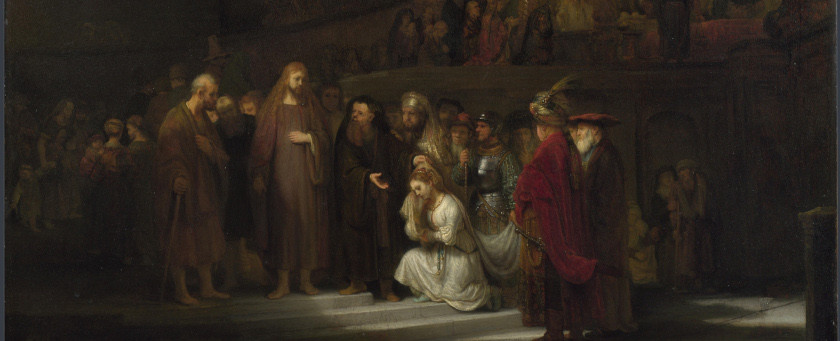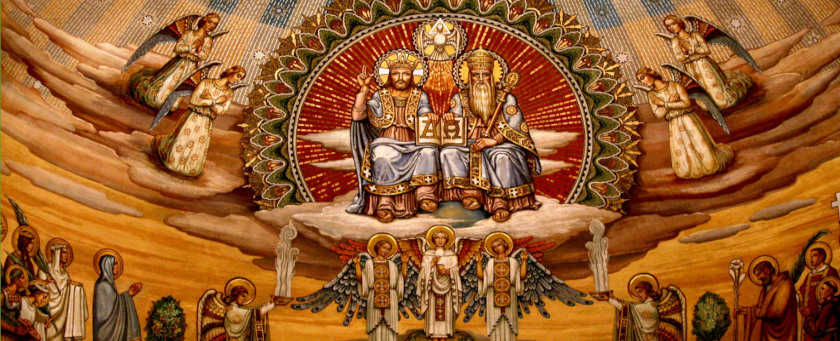The Lord Delivers us from Sin and Restores Us to Life
Fifth Sunday in Lent, Year C

(Audio recorded live, 6 April 2025)
Readings:
Is. 43:16-21; Ps. 126; Phil. 3:8-14; Jn. 8:1-11
Our reading from the prophet Isaiah and the psalm are about the restoration of Israel after the Babylonian Exile. Isaiah recounts for the people the way in which the Lord provided for them during the exodus, then says, “see, I am doing something new!” In other words, just as the Lord had delivered the Israelites from slavery in Egypt, so too, will the Lord deliver them back to their homeland, the land flowing with milk and honey. God does this for the people he formed for himself. That is why the psalmist says, “The Lord has done great things for us; we are filled with joy.” During these 40 days of Lent, we ourselves are like the Israelites, wandering the desert in search of sustenance and life. As Christians, we find both our sustenance and life in Jesus, who nourishes us with himself. He is our merciful brother, who intercedes for us to the Father, and he shows us the way of true justice.
St. Paul reminds the Philippians that he has given up all things that he may gain Christ and be found in him. He writes this letter while imprisoned and anticipating his own death. He appeals not to the righteousness of the law, but rather to the righteousness of God that comes through faith in Christ. In his letter to the Galatians he says, “For through the law I died to the law, that I might live for God. I have been crucified with Christ; yet I live, no longer I, but Christ lives in me; insofar as I now live in the flesh, I live by faith in the Son of God who has loved me and given himself up for me” (Gal. 2:19-20). So, in his own way, he is modeling his life after Jesus, who through his own passion, death, and resurrection, has set us free. He concludes, “I do not nullify the grace of God; for if justification comes through the law, then Christ died for nothing” (Gal. 2:21). In other words, our faith in Jesus goes beyond the law of Moses, for it is a law written not on stone, but on our hearts.
We see an example of this law of Jesus in today’s gospel. Jesus was teaching the people in the Temple when some scribes and Pharisees placed a woman between them and Jesus. The image is important, because she seems to stand in between heaven and earth; between the mercy of God and the condemnation of men. The scribes and Pharisees accuse the woman of being caught in the act of committing adultery. According to the Mosaic Law, the penalty for adultery is death. As it says in the Book of Leviticus: “If a man commits adultery with his neighbor’s wife, both the adulterer and the adulteress shall be put to death” (Lv. 20:10). Jesus’ response is to bend down and begin writing on the ground with his finger. The image of Jesus bent down is like God bending down to listen to an earthly appeal. He writes with his finger on the ground, as God wrote the Ten Commandments with his finger before Moses. And when they ask Jesus, “So what do you say?”, he straightens up and says, “Let the one among you who is without sin be the first to throw a stone at her.” Jesus’ upright posture conveys his authority as the True Judge. But, he knew he was being tested. The law says very clearly that both parties caught in the act of adultery are to be stoned, yet they only present the woman. If Jesus were to condemn her, he would be misinterpreting the law. Further, according to the law, those who witnessed the crime were to be the first to throw a stone, yet the crowd all walks away, beginning with the elders. They had wisdom enough to know their tricks were no match for the Son of God. Then comes the most tender part of this passage. Jesus asks the woman, “Has no one condemned you? … Neither do I condemn you.” Jesus shows forth the mercy of God, first, by defending her against her accusers, and second, by saving her life. Restoration is not merely a matter of returning home to the promise land, it is about the return of the soul to God. Jesus then gives her this command: “Go, and from now on do not sin any more.” Sin harms our relationship with God and Jesus teaches us how to remain in a state of grace. These are the words we pray at the end of every act of contrition: “to confess my sins, to do penance, and amend my life.” What does it mean to amend one’s life but to sin no more? Our gospel passage is a beautiful example of the mercy of God through Jesus.
And so, as we make our way through the desert to the land of plenty, we are mindful of what Jesus did by dying for our sins. He paid the ultimate price to appease God and restore us to the Father. For that reason alone, we owe him our praise and thanksgiving. May the communion we share today be an experience of the mercy and love of Christ, and may we, like the woman of today’s gospel, be freed from our sins, so we may enjoy heavenly delights, whenever we approach his holy altar.





Twitter
Facebook
Pinterest
Email